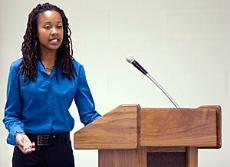For the first time in four years, the African American Student Advisory Council last night released a report card giving the University an average grade of D.
At a presentation attended by some 100 people, ASAAC officers said everything from student enrollment to graduation rates of black students needs improvement.
“In 1995, the University enrolled its largest African-American freshman class, which was 467 students,” Senadzi Kpeglo, secretary of AASAC, said. “In the past five years the largest African-American incoming freshman class was 418 students.”
The University received an F for its efforts in recruiting black students to enroll, citing a sharp decrease in the black freshman class size while the University’s overall freshman class size increased.
“We believe [the University] should increase financial aid,” Kpeglo said. “Another suggestion is to ensure all University scholarships seek minority applicants.”
Other suggestions for improvement included an increase in merit-based scholarships and an increase in black alumni participation in recruitment activities.
The University’s attempt to employ black faculty proportional to the black student population earned an F – the same grade it received in 2002. AASAC said the fall 2005 faculty does not reflect the black student population, reported to be 10 percent, and black faculty accounts for 4 percent of the total full-time faculty.
“This means that the African American faculty is not reflecting the African American student body,” Mycah Wilson, chair of AASAC, said.
She said all numbers were calculated using the University Planning and Analysis Web site.
In order to improve retention rates, where the University received a C, the organization suggested increasing financial aid to extend beyond the first year, improving faculty-student relations, increasing funding and staff support for student development programs targeted to blacks and improving the campus climate.
“I want N.C. State faculty to make students feel welcome,” Wilson said. “[I want them to] interact with students not just on an academic level.”
The Chancellor’s Leadership Award was a means of replacing the Dean’s Scholarship that targeted black and American Indian students. Because of legal issues involving scholarships based on race, the scholarship was replaced with the Chancellor’s Leadership Award.
“The Chancellor’s Leadership Award was established as a need-based scholarship in hopes that a large number of African American students would still get this scholarship,” Wilson said.
The University received a D for the award because it has not been able to enroll an equivalent number of black students as the Dean’s scholarship had in the past.
“We want, as a council, to see N.C. State be able to bring a number closer to the number of students who were awarded the Dean’s Scholarship,” Wilson said.
One of the suggestions offered by AASAC is to organize outside black scholarships with outside sources. The organization suggested faculty establish a scholarship with money from its own pocket.
“There is so much that students can do and so much more that administration can do,” Wilson said.
AASAC gave the University a C for the graduation rates of black students, stating that the graduation rates increased from 51 to 58 percent but that other demographics were graduating at a rate about 20 percent greater.
“We are improving but we’re not at the same level as our counterparts overall,” Wilson said. “African American [graduations] are increasing; however, we want that percentage to be up to just as high if not higher than our counterparts.”
Provost Larry Nielsen said the administration is not satisfied with where they currently sit and it looks forward to working together with AASAC to improve the numbers.
“We take this very seriously,” he said. “Not a day goes by that all of us in the administration aren’t thinking about working on ways to try to make our campus more diverse and more representative of the people.”
Chancellor James Oblinger agreed, stating that he believed it would be more beneficial if AASAC and the administration worked together.
“We’ve got a set of data, you’ve got a set of data; we don’t need a grade card if we’re working together on this,” Oblinger said. “I’ve been here 20 years. I assure you, we’ve made progress.”
Oblinger said part of a previous discussion was how to keep the University an environment that is committed to diversity.
“The discussion is moving the right way; we just need to keep it going,” he said.
Members of the audience said they felt the administrators present were fairly responsive.
“I’m glad it was a climate of understanding,” D.J. Hardy, a junior and the president of 100 Black Men of America, Inc., said. “Now I just pray the administration takes an active role in acknowledging the information that was presented.”
Wilson said it is not just an administration issue; students need to be involved as well.
“Don’t look at the data and point fingers,” she said. “Look at how you can help the administration improve their grades and not just sit back and wait for them to change.”








